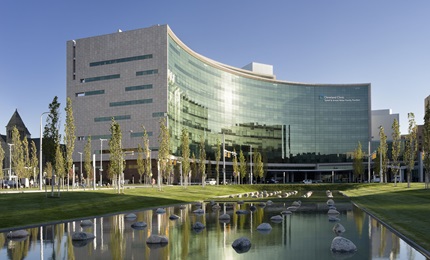Irene Wang, PhD
Insurance
Is Cleveland Clinic Part of Your Insurance?
Review a list of accepted insurance plans for our Northeast Ohio locations or learn more about purchasing a contracted managed care plan.
View All PlansAbout Irene Wang, PhD
Dr. Irene Wang is Research Director and Staff Scientist at the Cleveland Clinic Epilepsy Center, Joint Staff at Department of Biomedical Engineering, Lerner Research Institute, Cleveland Clinic, and Associate Professor of Neurology at the Cleveland Clinic Lerner College of Medicine.
The focus of Dr. Wang’s research is to advance surgical treatment of MRI-negative (nonlesional) epilepsy patients through novel imaging and neurophysiology techniques. Her specific research interests are: epilepsy imaging (3T and 7T structural MRI, MR fingerprinting), MRI post-processing (voxel-based and surface-based methods), as well as integration of multiple modalities used in pre-surgical evaluation. To date, her publications include 104 peer-reviewed papers and 12 book chapters featuring >2500 citations appearing in the ISI database. Dr. Irene Wang’s research has been featured on the cover of Brain, Human Brain Mapping, Journal of MRI and Clinical Neurophysiology. Her work has been highlighted many times on Epilepsy Currents, and more recently on Nature Reviews Neurology.
Dr. Wang has received several awards and grants from various funding agencies including National Institute of Health (NIH) R01. She is a charter member of Emerging Imaging Technologies in Neuroscience (EITN) study section. Dr. Wang also chairs the MRI Data Task Force of the International League Against Epilepsy (ILAE) Big Data Commission, and serves as a committee member of the Imaging Task Force of the ILAE Diagnostic Methods Commission.
Education & Professional Highlights
Appointed
2015
Education & Fellowships
Medical Education - Case Western Reserve University School of Medicine
Cleveland,
OH
2008
Undergraduate - Zhejiang University
Zhejiang,
2003
Professional Highlights
- Cover Image of Human Brain Mapping, December 2012
- Research highlighted on Epilepsy Currents, March/April 2016
- Cover Image of Brain, November 2016
- Research highlighted on Epilepsy Currents, March/April 2017
- Cover Image of Brain, July 2017
- Cover Image of Journal of MRI, May 2019
- Research highlighted on Epilepsy Currents, May/June 2020
- Research highlighted on Nature Reviews Neurology
- Cover Image of Clinical Neurophysiology, Dec 2021
Specialty Interests
Epilepsy
Awards & Honors
- American Epilepsy Society Young Investigator Award, 2013
- Cleveland Clinic Innovator Award, 2016
- Cleveland Clinic Neurological Institute Women’s Leadership Cohort, 2020-2022
Memberships
- International Society for Magnetic Resonance in Medicine
- Society of Neuroscience
- American Epilepsy Society
- American Clinical Magnetoencephalography Society
- American Clinical Neurophysiology Society
Research & Publications
See publications for Irene Wang, PhD.
(Disclaimer: This search is powered by PubMed, a service of the U.S. National Library of Medicine. PubMed is a third-party website with no affiliation with Cleveland Clinic.)
Industry Relationships
Cleveland Clinic physicians and scientists may collaborate with the pharmaceutical or medical device industries to help develop medical breakthroughs or provide medical expertise or education. Cleveland Clinic strives to make scientific advances that will benefit patient care and support outside relationships that promise public benefit. In order for the discoveries of Cleveland Clinic physicians' and scientists' laboratories and investigations to benefit the public, these discoveries must be commercialized in partnership with industry. As experts in their fields, Cleveland Clinic physicians and scientists are often sought after by industry to consult, provide expertise and education.
To assure professional and commercial integrity in such matters, Cleveland Clinic maintains a program that reviews these collaborations and, when appropriate, puts measures in place to minimize bias that may result from ties to industry. Cleveland Clinic publicly discloses the names of companies when (i) its physicians/scientists receive $5,000 or more per year (or, in rare cases, equity or stock options) for speaking and consulting, (ii) its physicians/scientists serve as a fiduciary, (iii) its physicians/scientists receive or have the right to receive royalties or (iv) its physicians/ scientists hold any equity interest for the physician's/scientist's role as inventor, discoverer, developer, founder or consultant.* In publicly disclosing this information, Cleveland Clinic tries to provide information as accurately as possible about its physicians' and scientists' connections with industry.
As of 8/3/2024, Dr. Wang has reported no financial relationship with industry that is applicable to this listing. In general, patients should feel free to contact their doctor about any of the relationships and how the relationships are overseen by Cleveland Clinic. To learn more about Cleveland Clinic's policies on collaborations with industry and innovation management, go to our Integrity in Innovation page.
Public Health Service-Reportable Financial Conflicts of Interest. Cleveland Clinic scientists and physicians engage in basic, translational and clinical research activities, working to solve health problems, enhance patient care and improve quality of life for patients. Interactions with industry are essential to bringing the researchers' discoveries to the public, but can present the potential for conflicts of interest related to their research activities. Click here to view a listing of instances where Cleveland Clinic has identified a Public Health Service (PHS)-Reportable Financial Conflict of Interest and has put measures in place to ensure that, to the extent possible, the design, conduct and reporting of the research is free from bias.
* Cleveland Clinic physicians and scientists subscribe to the guidance presented in the PhRMA Code on Interactions with Healthcare Professionals and the AdvaMed Code of Ethics on Interactions with Health Care Professionals. As such, gifts of substantial value are generally prohibited.
